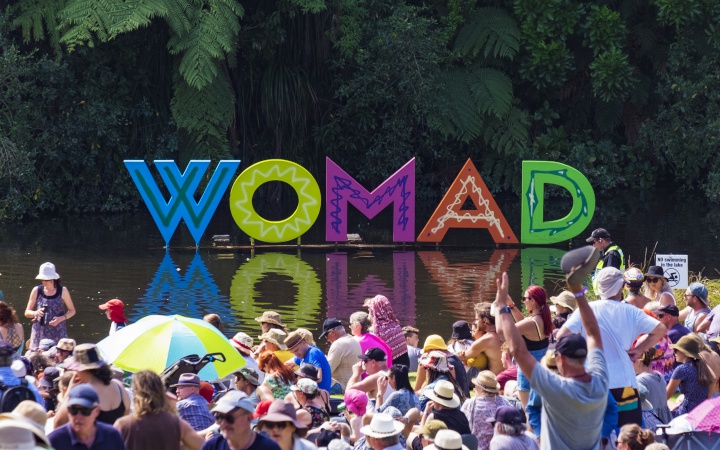
Photo: Lulu Galpin Verdee Photography and Fashion
Last week, I reflected on the incongruity, and the joy of being at WOMAD whilst processing the tragic events of Friday 15 March. More than any event I have been involved in, WOMAD makes it acutely clear to me how connected we all are. Humans share over 99% of our DNA and it seems we also share most of our musical DNA. All music comes from the same place - our creative consciousness. Musical traditions emerged to bring people closer together through expression, and the creation of ecstatic and uplifting feelings. This spiritual expression and its use for bonding and healing communities and bridging Cultural divides is arguably still a big part of the function of music and events in modern society.
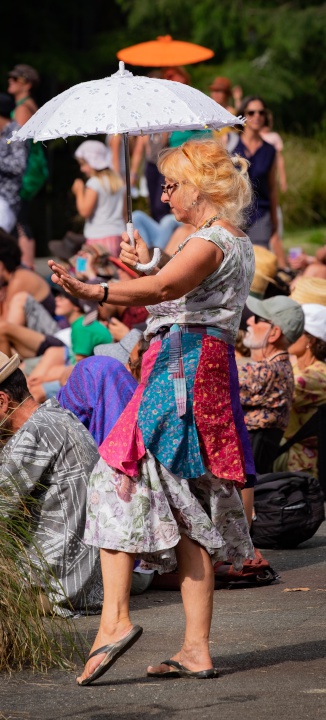
Photo: Lulu Galpin Verdee Photography and Fashion
As a trained Cultural Anthropologist and amateur ethnomusicologist I am perhaps more consciously aware of these deeply spiritual and intercultural music connections than the average punter, but the reactions of people at Womad proves to me that we all feel them and we all resonate with these rhythms and harmonic frequencies when we hear them and feel them in person. What follows is a review of some of the beautiful music, some inspiring words shared by the artists at WOMAD 2019 in Taranaki and a discussion of the deep intercultural connections and spiritual traditions evident in the music on display.
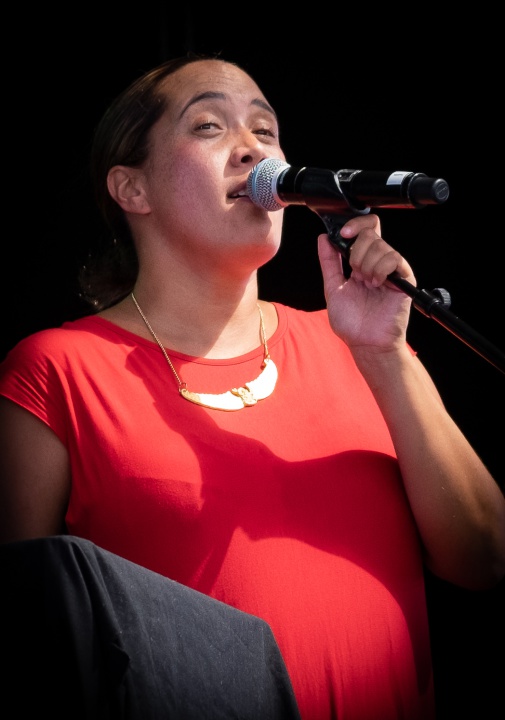
Ria Hall. Photo: Lulu Galpin Verdee Photography and Fashion
"We'll pay tribute the only
way we know how. By sharing our love of music."
SILKROAD ENSEMBLE, WOMAD
2019
Click a link to play audio (or right-click to
download) in either
MP3
format.
Silkroad Ensemble was one act at WOMAD that is very focused on drawing attention to this rich tapestry of interconnections between the various ancient musical traditions and Cultures of the world. The speech from one of the band members below summarises the feeling at WOMAD very well in its discussion of the virtuosity and generosity of the other.
Founded by superstar cellist Yo-Yo Ma, Silkroad Ensemble is a Grammy Award-winning virtuoso collective inspired by “the rich musical language borne from our cultural differences.” The group hosts an ever-evolving roster of members represent dozens of nationalities and instrumental disciplines. The repertoire brought together Vietnamese, Chinese and Kazakh music, Finnish folk song and Indian classical music among others. Some interesting instruments featured included traditional Galician Bagpipes from Spain and the ancient ‘Sheng’ flute from China.
The music from the Islamic world at Womad 2019 in particular made this interconnection of all the musical traditions of the world so clear as the Middle East region was once a central point and a great influencer on the musical and cultural world. Once you start looking closer, it is clear both how much the music of the Middle East has influenced music all around the world (including Europe) and even how closely tied its history is to older African music forms. The Silkroad ensemble repertoire, for example included a distinct Turkish influence, as Istanbul sits right in the middle of the historic Silk Road and is the meeting point between East and West.
African Origins
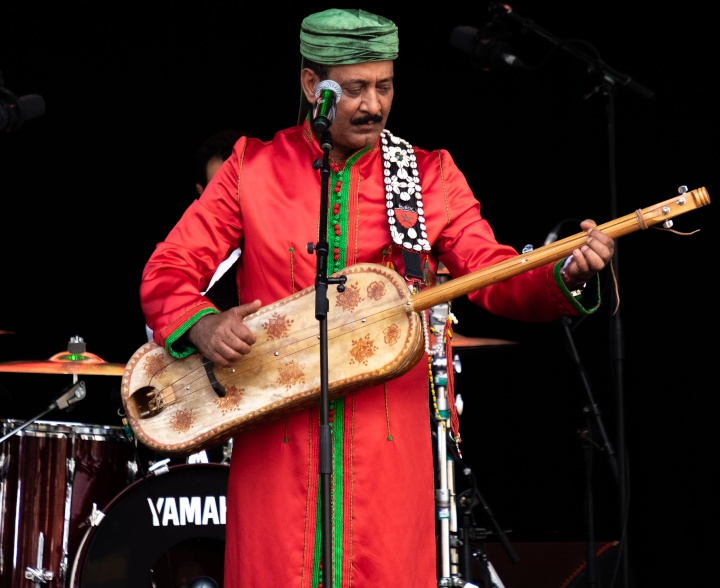
Maalem Hamid El Kasri. Photo: Lulu Galpin Verdee Photography and Fashion
Listening to the Moroccan ‘Master Musician’ Maalem Hamid El Kasri, one can see the thread of shared musical heritage between Africa and the Islamic world most potently. El Kasri is an exponent of the guembri - a three-stringed bass lute found commonly in gnawa music - the spiritual music tradition of former Black-African slaves in the North African region. This gnawa roots music can in turn be traced back to the rich ‘Griot’ tradition of West African bard/shamans. The griots were often wandering poet/storytellers and keepers of an ancient shamanic spiritual and musical tradition and form a core part of West African communities even today. However, this African shamanistic tradition has also merged with the Berber and Arabic influences to create a uniquely North African music tradition. El Kasri truly is a master of his art and his hypnotic grooves and melancholic vocal mesmerised the WOMAD audience with a depth and composure only evident in truly spiritual music. This amazing show featured accompaniment by three backup vocalists who danced and whirled like sufi Dervishes as well as providing traditional metal clapper percussion.
Also drawing deeply from the Griot spiritual tradition was SONA JOBARTEH. From The Gambia, Sona is the first professional female virtuoso of the Kora to come from a Griot family. The Kora is a 21-stringed African harp famous by Malian legend Toumani Diabaté. However, the Griot tradition is a very male-dominated, 700-year-old hereditary tradition, so her pioneering the way for females within it is no joke. Sona has done it in style - her playing is virtuosic and her strong, yet beautifully feminine singing a perfect match for the instrument. She featured a great full band including a conga and percussion player who used the interesting gourd percussion at the start of the clip below. She exuded a deep spiritualism in her music and her communication with the audience powerful moment was when Jobarteh dedicated a traditional Gambian song to"peace and the absence of suffering."
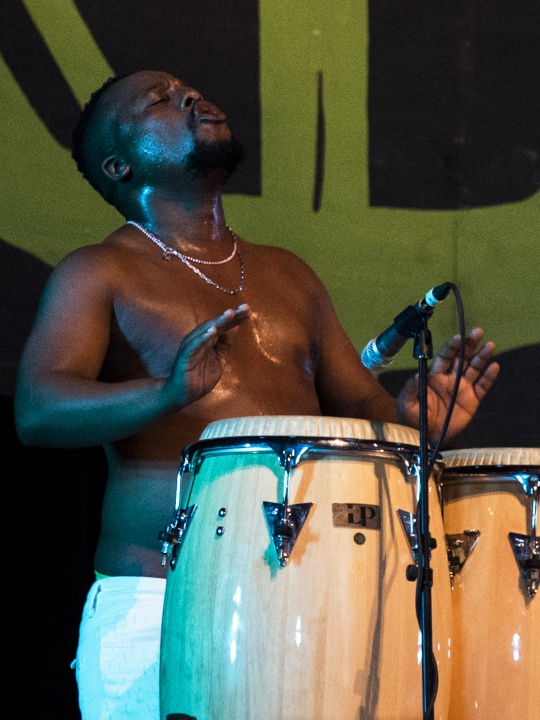
Percussionist, BCUC. Photo: Lulu Galpin Verdee Photography and Fashion
Another standout act at WOMAD, also drawing deeply on African spiritual traditions were South African “Afropsychedelic” maestros BCUC or (Bantu Continua Uhuru Consciousness). This seven-piece from Soweto are currently shaking up the South African music scene and gaining success abroad. These guys were super dynamic and powerful. Driven by two massive bass drums and a conga and percussion player, the core of BCUC is the African rhythms ranging from traditional invocations through to upbeat Fela Kuti style Afrobeat often within one 20 minute song.
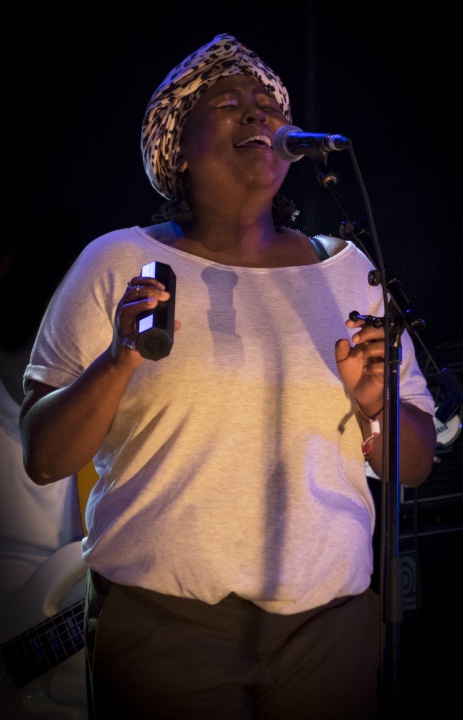
Kgomotso Mokone, BCUC. Photo: Lulu Galpin Verdee Photography and Fashion
There are definitely shades of Ladysmith Black Mambazo and Soweto ‘township’ style with harmony vocals showing the band are rooted in this rich musical tradition. Kgomotso Mokone, the one female member of the band adds amazing soulful vocals to the male choral backdrops and shamanistic/ war-chanting invocations providing a beautiful contrast. The lead singer’s dancing was something to behold too, he regularly kicks his foot above his head and at one point jumps about head high in the air landing seemingly on his back.
The pure shamanistic light of this group’s performances washed away some of the pain we were all feeling and helped restore a connection to others. The eerily familiar notes and harmonies resonate with a shared ancestral memory in our DNA and the rhythms make it near impossible to resist the urge to dance. BCUC truly exuded a spiritualism and reverence for the gravity of sound as a tool for purifying our souls and bringing light, as evidenced in this invocation they offered up in honour of the Christchurch victims.
"I will talk about how we are all unified right now.” BALOJI, WOMAD 2019
Also seemingly drawing from this deep shamanic African spiritualist tradition of the griot (poet/musician) was Baloji, a Congolese/Belgian musician and rapper. Baloji incorporates the core Congolese musical traditions such as Congotronics influenced electronic Thumb piano synth melodies, tropical highlife and soukous. However he has contemporised them by adding a funky psychedelic afrobeat vibe and rap influences. Performing with a tightly funky live band, he brought a really relaxed and smooth flowing pace with very funky and smooth hip hop beats and nice melodies. His poetic songwriting stood out to me even with my limited French capacity. His lyrics, discussed sexual politics, the immigrant experience, community and war. L’hiver Indien for example discusses the cold neverending winter Congolese migrants experience in France.
Baloji’s costume changes were next level. He seemed to change costume for every song and donned everything from a head scarf under a fedora to Congolese headscarf/turbans and a variety of multicoloured feather ruffs and even the bright yellow Napolean-esque tassels seen in the video above. It seems Baloji is all about style, a quick look through his Youtube videos shows a real interest in high production values and some nicely retro tropical themes.
"This festival represents all the things I stand for: knowledge, respect and LOVE for other cultures." ANGELIQUE KIDJO, WOMAD 2019
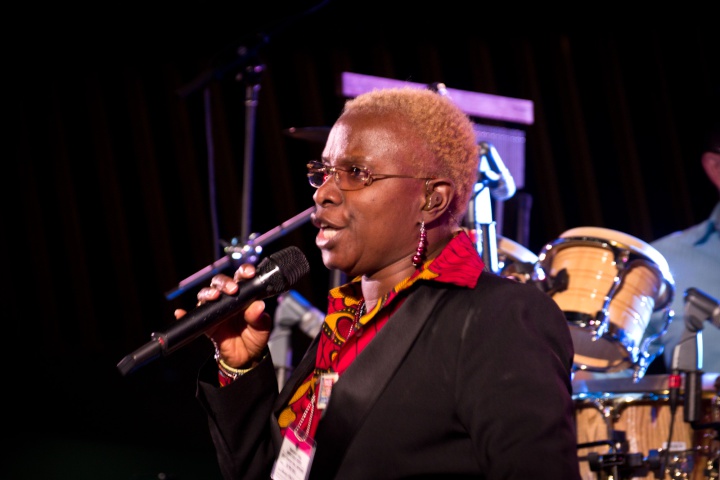
ANGELIQUE KIDJO, probably one of the biggest name acts at WOMAD, certainly did not disappoint. From Benin, Kidjo has received numerous accolades over a career of three decades. Kidjo is very politically active as an ambassador for Amnesty International and UNICEF. In the recording below she spoke from the heart about the Christchurch massacre and the need for love, understanding of difference and celebration of music and the human family. She also discussed issues such as Child Brides and Women’s rights in Africa and the developing world.
Click a link to play audio (or right-click to
download) in either
MP3 format.
Kidjo’s latest project is a reinterpretation of the 1980 album Remain in Light by the Talking Heads. In a discussion with Kim Hill before WOMAD she said this was about taking the album back to the West African roots which influenced it, with the aim of "reconciling the African people with rock and roll". These songs were given an entirely new life by Kidjo and worked so much more than I would have expected as very traditional African pieces with complex polyrhythmic structures.
Two European acts at WOMAD also demonstrated strong African Spiritual music roots.
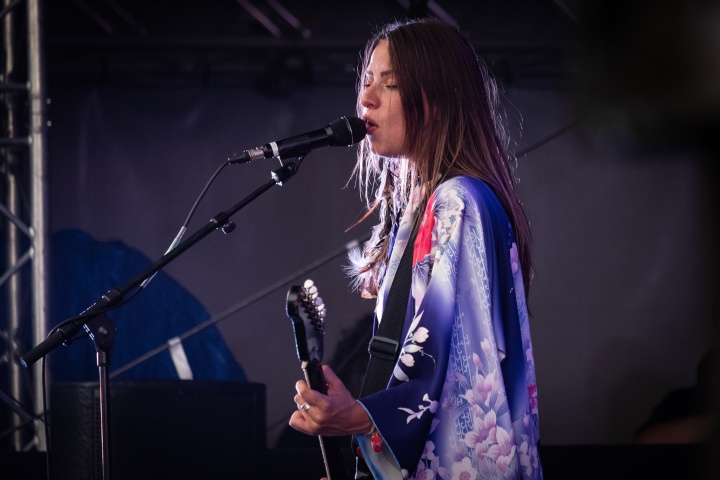
Cato van Dijck, My Baby. Photo: Lulu Galpin Verdee Photography and Fashion
My Baby are a trio with members from the Netherlands and New Zealand playing a highly shamanistic form of roots-driven hypnotic dance music consciously incorporating elements of Moroccan Gnawa and West African desert blues. Dutch female vocalist and violinist Cato van Dijck is the soul of the group on violin and lead vocals, with her brother Joost on drums providing the pounding heart. They picked up Kiwi guitarist Daniel 'Dafreez' Johnston who provides the psychedelic skank and funky rhythms with insane noodling in the Hendrix/desert blues vein.
My Baby have been touring extensively over the last three years including in New Zealand almost every summer so they are a well oiled dance machine now. They build up beautiful soundscapes ranging from swampy Blues and funk right through to psychedelic EDM tunes using no samples. They certainly had the dancefloor grooving on both occasions at WOMAD to their hypnotic grooves and tight layered melodies providing a transcendent and ecstatic experience.
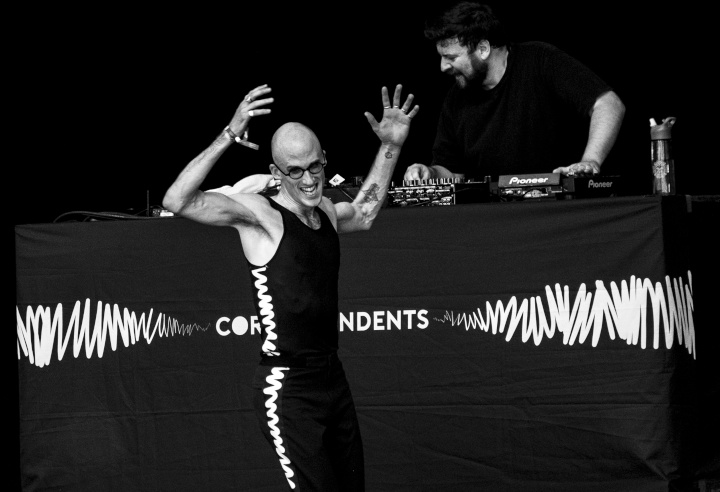
The Correspondents. Photo: Lulu Galpin Verdee Photography and Fashion
London based duo, The Correspondents, are an anomaly. On paper they don’t sound like much, however, their live performances are a high energy spectacle to behold. Heavily swing, jazz and blues influenced electro and drum and bass beats by Chucks drive the performance, but singer and dancer Mr Bruce sings, scats rapidly, riffs with the crowd and dances as if possessed for the full set. He is definitely channeling some of the African spiritualism of this rich musical tradition in his energetic performance that mesmerises the crowd and even has the connection to the audience to crowd-surf into the WOMAD mosh pit. In a nice bit of aftercare Mr Bruce also took a moment before starting the next song to inquire if the guy whose head he landed on was OK.
Middle Eastern Influences
This African spiritual tradition also appears to have had some influence on the traditions of pre-Islamic music and spiritualism. The ancient music of the Middle East, perhaps unsurprising given the geographic proximity and cultural connections to North Africa, bears some resemblance to Sub-Saharan African music forms - utilising similar melodic modes and complex polyrhythms. Many have noted similarities between the Griot and Ethiopian spiritual traditions and the ancient spiritual orders of the Middle East such as the Gnostic Sufi and Zoroastrian traditions. Musical expression reached a highly refined form in the ancient Middle Eastern region, probably by mixing these African influences with others from India and the Near-East.
The influence of Middle Eastern music then spread globally through the burst of enlightenment and expansion of Islam’s Golden age to light up the dark ages of Europe with new musical influences, instruments and forms. This influence happened both through Eastern Europe (the Silk Road) and through the Mediterranean, in particular Al Andalus (the Moorish empire in Andalusia, Spain).
The Islamic gift of music to the West was perhaps seen most clearly in the Andalusian ‘Gitano’ Flamenco of Spain. The ‘Gitano’ (Spanish Gypsy) flamenco tradition emerged when the Christians reconquered Andalusia between the 11th and 13th century AD (La reconquista). To avoid persecution or forced deportation, many Moors took refuge among the already persecuted, yet tolerated Gitano population. With the Gitano, the Moors were able to return to their musical practices including their folk singing which eventually evolved into a shared cultural heritage. Al Andalus was also where the modern form of the guitar was invented through a merging and refining of North and West African musical instruments such as the Oud.
The guitar-heavy Andalusian flamenco and rumba music of The Original Gypsies performing at WOMAD, as a result, evidenced a distinctly Middle Eastern flavor in its modal forms and vocals. This group is an offshoot of the Gypsy Kings dynasty of the Reyes family featuring two original band members. They cannot use the Gypsy Kings name as this is trademarked and still in use by some of the other family members after a bit of a schism. The huge group featuring eight guitars and flamenco tap dance (another Middle Eastern influenced form) showed some virtuosic pop-flamenco strumming and vocal harmonies. They played some of the classics such as Volare, Bamboleo and a cover of Hotel California that certainly pleased the boomer demographic, and those of us who liked to dig around in our parents old record collections as kids. At times it was pretty cheesy as you might expect but the sheer virtuosity of the guitar work and singing on display stopped it descending into a mere cover band showpiece. There was plenty of the classic flamenco innovations of ‘palmas’ (hand clapping) and flamenco tap dance.
This Islamic musical inheritance on Spain also lent a lot of influence to the distinctive sound of ‘Latin American music’ as we understand it now. It just so happened that the indigenous music of South America, and the West-African slave music imported there with the Spanish also favoured the semitones and sliding vocal scales of flamenco and the Islamic world. This happy coincidence resulted in many of the hybrid indigenous/afro/Latin American folk music forms such as Cumbia.

Denise Carlos, Las Cafeteras. Photo: Lulu Galpin Verdee Photography and Fashion
Another Latin-influenced group at WOMAD was Las Cafeteras - a ‘Chicano’ (Mexican American) hip-hop group from LA with strong First Nations influences and uplifting and explosively political attitude. They featured indigenous percussion and rhythms, Latin guitar and ukulele and incorporate Latin American folk forms such as Veracruz’ native folk Son Jarocho music, Mariachi, and Cumbia. They blend this mix into their own unique style mixed with rock and hip-hop influences. They featured four versatile vocalists singing and rapping and even some flamenco-style Mexican tap dancing or ‘zapateado’ taking it full circle to the Andalusian flamenco roots.
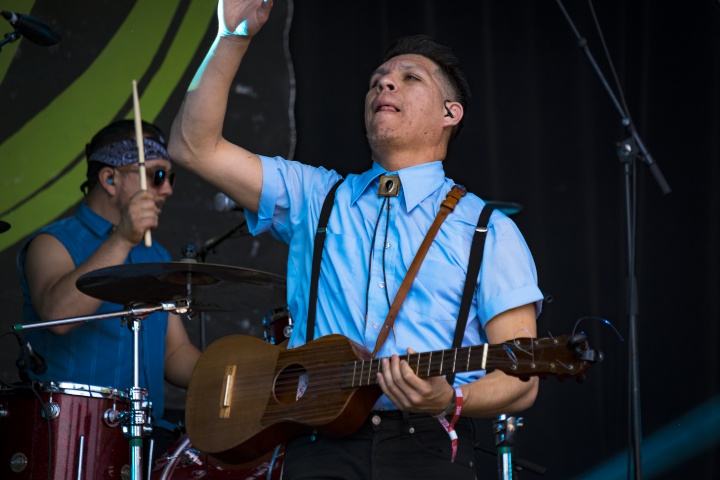
Las Cafeteras. Photo: Lulu Galpin Verdee Photography and Fashion
It even had a distinctly Manu Chao Latin pop sound at times due to the strong melodies and politically charged lyrics.Their lyrics focus on issues such as the immigrant experience in LA, border walls, hard work, family and the importance of solidarity and togetherness and the spirit of the Zapatista movement. However not for a minute did any of this feel dreary or heavy. Throughout, it was positive and fun with a feel of some of the best old-skool hip-hop like De La Soul.
Take for example the lyrics to If I Was President “my first lady would be my Moms / Cause she’d slap me / At the first thought of drone strikes / And dropping bombs.” Or this hat tip to participatory democracy from the same song: “If I was president. Hey, What would you do? If I was president, Hey, I'd ask you. If you were President, What would you do? If it was you, you, or you.”
"...with my music, which is my only weapon, I hope I can bring you a little bit of peace." LA DAME BLANCHE, WOMAD 2019
The Latin music at WOMAD completes the circle back to African shamanism, in closing performer on Sunday night of the amazing Paris-based Cuban talent La Dame Blanche - the daughter of a member of Buena Vista Social Club. La Dame absolutely tore the roof off the brooklands stage with her funky infectious mix of Afro-cuban santeria infused futuristic beats with influences that ranged through hip-hop, Reggaeton, Cumbia and of course a dash of Afro-Cuban Salsa and Son Cubano.
The three piece featured a drummer and guitarist/looper/sampler but the main show was very much La Dame herself with a powerful virtuosity on the flute which she often looped nicely to build the harmonic sections of her songs, before switching to her amazing voice and her hypnotic rapidfire rap verses in Spanish. She was also clearly having a lot of fun dancing throughout the set, with a Cuban cigar in her hand. A beautiful moment was her WOMAD closing final song on Sunday night where she brought out a diverse group of Women and young girls from the crowd to dance with her on stage.
What not so many people realise is that Eastern European music was another route by which Western classical music adopted many of its instruments and motifs from the Islamic world.
Burgh (2006), suggests that the roots of Western classical music ultimately lie in ancient Egyptian art music via cheironomy (choral music) and the ancient Egyptian orchestra, which dates to 2695 BC. This influence spread via Ottoman martial music via the expansion of the empire and the silk road with the many brass instruments adopted in force by the Romani culture and others which shaped European folk music and later classical forms.
Rebetien was one European band at WOMAD that would not exist if not for the influence of Turkish music on Europe. Although a popular Greek genre of music, “Rebetiko” is, musically speaking, a synthesis of elements of Greek music and Ottoman Turkish music. This was essentially a synthesis of two deeply rooted spiritual music traditions of Greek Orthodox ecclesiastical chant (Byzantine music) and the modal traditions of Ottoman art music and café music. These modal traditions stretch back into history and connect to Iraq as well as other influences from the Steppes and the ragas India. In 2017 rebetiko was added in the UNESCO Intangible Cultural Heritage Lists.
Rebetien was a meditative performance with a nostalgic sound featuring accordion, bass-guitar, bouzouki and violin that they describe as “reminiscent of the gramophone era”. The Turkish and Greek influences were also subtly combined with other closely-related modal styles of various Eastern Mediterranean and Balkan musical traditions. Listening to them sitting on the lawn by a pond full of ducks in the late afternoon New Plymouth sun was a truly peaceful and transporting experience.
Rebetien performed live for RNZ at WOMAD 2019:
Turkish martial music was particularly in vogue in Vienna during the late 18th century, however, well before that it had already spread across the Turkish controlled Eastern part of Europe and into the West through the Cultural pollinators known as the Romani. For this reason Serbia, Macedonia, Romania and other Balkan states that formed part of the Ottoman empire have a very Brass instrument focused folk music tradition. Representing this Eastern European tradition at WOMAD 2019, both Wellington’s ‘Balkan Brass Bandits’ Niko Ne Zna and German Gypsy techno legend Shantel rocked the WOMAD stage with a heavily brass instrument driven Eastern European music.
Shantel and the Bucovina Club Orkestar, on the other hand, was fun but to be honest was a little disappointing and was in my opinion upstaged by Niko Ne Zna. The full Balkan ‘orkestar’ of Stefan Hantel (AKA Shantel) just didn’t seem to come together here. Shantel first found fame as a DJ with classic tunes such as Disko Partizani, and Disko Boy a which were hits in Europe and Turkey and his Bucovina Club movement helped to drive a renaissance of Eastern European music in nightclubs across the world in the 90s and noughties. However Shantel clearly expected Kiwis to know the song and call and response vocals, which they didn’t. As a live performer he didn’t really have a magnetic energy or rapport with the audience, not helped by the fact he was on the bowl stage with a lake in between the two camps. The lake was used to good effect on Sunday night by a French guy floating on a giant inflatable watermelon. While it was entertaining and fun to dance to, the Bucovina Club Orkestar certainly lacked the dynamic and unhinged craziness of a real Romani orchestra that Niko Ne Zna managed to capture. It all felt a little too staged and overproduced to me and may as well have just been a Shantel DJ set.
Wellington’s Niko Ne Zna are firmly in the Balkan Brass tradition and play some of the classics of this region as well as their own original tunes. I interviewed band leader Frankie Curac for Scoop before WOMAD here. The band played two extremely well received shows at WOMAD and had people of all ages dancing to their infectious bouncing balkan brass rhythms. The all mobile brass band showed some pretty complex and dynamic stage choreography making full use of the large WOMAD stage and cordless pick up mics on the instruments to bring a really theatrical and farcical vibe in the vein of Emir Kusturica, director of blockbuster Balkan films such as Black Cat White Cat. This video is a segment of their original song Party Everybody with which they invited everyone to have "a peace party with Niko Ne Zna". You can catch Niko Ne Zna in action with dancers from the Le Dance dance troupe at this weekend’s Cubadupa festival in Wellington.
That’s all for another year at WOMAD. I am sure we can look forward to some more equally inspirational acts in 2020 in the seemingly endless world of music and dance. Take care, be kind and love your fellow humans.
Peace


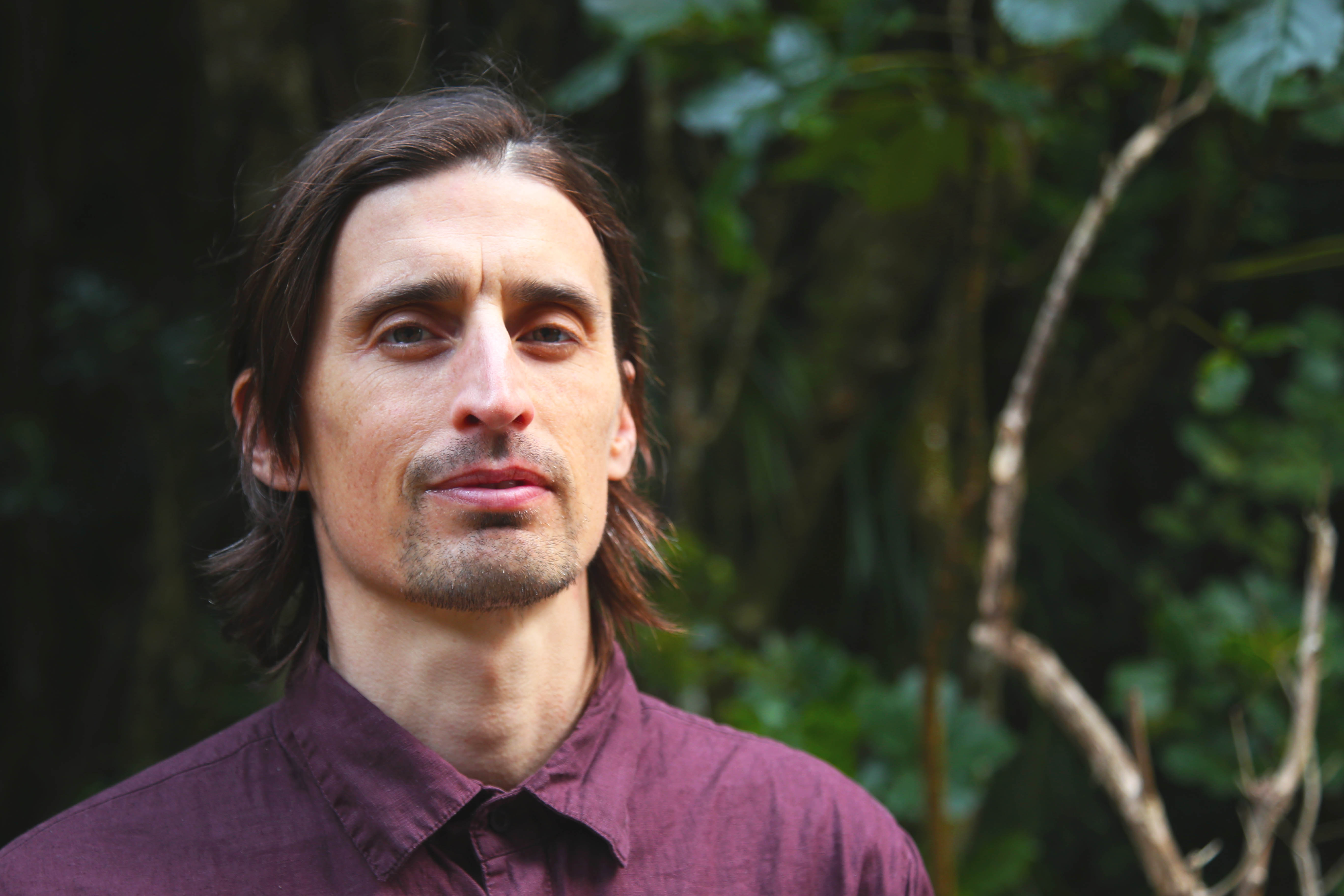
 Eugene Doyle: Writing In The Time Of Genocide
Eugene Doyle: Writing In The Time Of Genocide Gordon Campbell: On Wealth Taxes And Capital Flight
Gordon Campbell: On Wealth Taxes And Capital Flight Ian Powell: Why New Zealand Should Recognise Palestine
Ian Powell: Why New Zealand Should Recognise Palestine Binoy Kampmark: Squabbling Siblings - India, Pakistan And Operation Sindoor
Binoy Kampmark: Squabbling Siblings - India, Pakistan And Operation Sindoor Gordon Campbell: On Budget 2025
Gordon Campbell: On Budget 2025 Keith Rankin: Using Cuba 1962 To Explain Trump's Brinkmanship
Keith Rankin: Using Cuba 1962 To Explain Trump's Brinkmanship